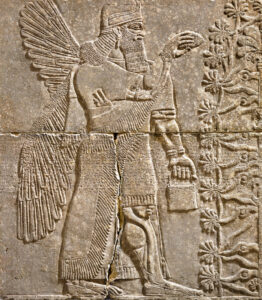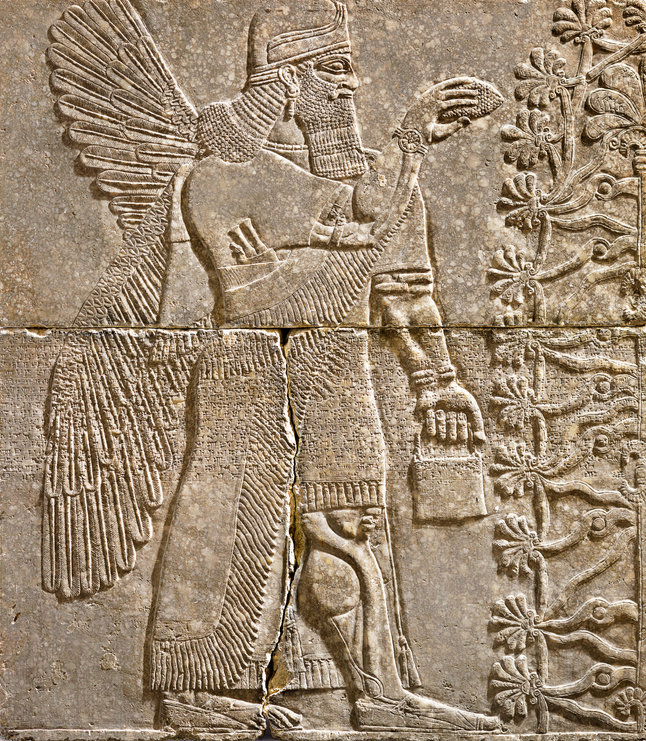
“The Bible is written for us, but it’s not written to us. It’s not in our language. It’s not in our culture. It doesn’t anticipate our culture or any other culture since that time.” So, when John Walton teaches about the book of Job, he dives deep within what the surrounding cultures of the ancient Near East thought and believed about their relationship with their gods. Here are some of his insights on the book of Job and its relationship to the ancient Near East.
The book of Job is fully embedded in the ancient world. Even though it’s nor indebted to any particular piece of literature in the ancient world, it’s embedded in that world. That means the conversation about Job is unfolding in that context. Even when the book is taking a different perspective from what others in that time and culture might take, it’s still having the conversation in the context of that culture. As you read Job, notice how Job’s friends represent Near Eastern thinking and how he resists it and them.
While Job is not an Israelite (he’s from the land of Uz), it’s evident the book of Job is an Israelite book. It was written by Israelites for Israelites. Also, since it talks about the situation of a pious sufferer, it fits into a literary category known in the ancient world. There are several other pieces of literature that discuss the pious sufferer. However, the answers given in the book of Job are very different from what is found in other works of the ancient world.
There is an early Sumerian work called, “A Man and His God.” In this work, the person is suffering. He confesses himself ignorant of any offense that he might have committed. He suffers illness. He’s a social outcast. “But at the end of the book, sins are revealed to him and he confesses his sins and is restored to health.” The philosophy here is there is no sinless child born; everyone has sins.
There is an Akkadian Mesopotamian text called “A Dialogue Between a Man and His God.” Again, the person is ignorant of any possible offense. The pious sufferer motif is the idea that someone who on the surface looks like they’ve done everything right, that they are pious in all the right ways, yet they are suffering. Here, the man suffers illness and eventually is restored to health. There is no philosophy given here; no divine favor assured.
“One of the most famous pieces of literature in the ancient world is another Akkadian, Babylonian one called “Ludlul bel Nemeqi,” “I Will Praise the God of Wisdom.” Again, there is a character who is conscientious and pious, ignorant of any possible offence. And yet, he finds himself a social outcast. He’s suffering illness. What the gods say is unclear. His protective spirits have been chased away. He talks about demon oppression. In the resolution of his situation, the god appears in a dream and gives him a way to make a purification offering that brings appeasement. His offenses are born away; his demons are expelled; he’s restored to health.
Again, the implication is that he was not really without offense. The philosophy behind this work is that the gods are inscrutable. Who can know what they are doing? It ends in a hymn of praise to the Babylonian god, Marduk.
There is a final work called “The Babylonian Theodicy.” Here the person claims piety, but his family is gone and he’s suffering poverty. In this case, there isn’t any resolution of his situation. The conclusion is that the purposes of the god are remote; you can’t tell what they’re doing. It seems to say that the gods have made people with evil inclinations and prone to suffering. That’s just the way things are.
“We can see that they offer a very different perspective on the gods and the suffering people experience.” The answers we find here is divine inscrutability— you really can’t know what the gods are doing. Everyone sins, “and therefore in suffering, you can never claim that it was not deserved.” Or even that the gods made humanity crooked. No one can do everything that the gods require. “So, there would always be something that the gods can get angry about.”
There tends to be less of an inclination to assign blame for suffering in the ancient Near East. “People are really without information. The gods have not communicated forthrightly.” The Egyptian, Babylonian, Canaanite or Hittite gods have not really revealed themselves. There is no clear communication about what they desire, what will please them. “There is no sense of that in the ancient world.”
People in the ancient Near East believed the gods were largely inconsistent and had their own agendas. They might act differently from one day to the next. Therefore, even though they feel their situation is the result of the god’s neglect, anger or change of mind, “they really have no way to think through it all.”
In the ancient world, if the gods became angry, people believed they would remove their protection; and as a result, the individual would be vulnerable, “in jeopardy from demonic powers” or other forces. In “Ludlul bel Nemeqi,” after the person has done everything he can think to do, he says,
I wish I knew that these things were pleasing to one’s god. What is proper to oneself is an offense to one’s god. What is in one’s heart seems despicable is proper to one’s god. Who knows the will of the gods in heaven? Who understands the plans of the underworld gods? Where have mortals ever learnt the way of a god?
Notice the frustration in what the speaker says. What would it be like to live in such a world, where there are powerful beings who affect everything you do, but have not told you what they expect of you or what will please them; or what will make them angry. What if you had a job like that, where you were being held accountable, yet your boss never made it clear what it was you were supposed to do or not supposed to do? And that you were punished or rewarded based on your guesses.
The Bankruptcy of Polytheism in Job
This is a little of what is in the literature behind the book of Job. “But Job so far transcends them; has so much more to offer.” For example, with Job there is no inclination toward polytheism even though in the ancient world, polytheism was the common way to think about the gods. There is a small bit of a community in the opening chapters with the divine council, but no suggestion of polytheism. Job even makes some affirmations to stand against polytheism. In Job 31:26-28, he swears he has not been enticed by the sun or moon, which would have been iniquity, “for I would have been false to God above.”
This only makes sense in a monotheistic Israelite context. All the other people groups around routinely worshipped the sun and the moon. This wasn’t an aberration. Only in an Israelite context would this have been a reasonable claim for Job to make that he had not raised his hands to praise the sun or the moon. Job has a good deal of certainty about his righteousness, giving the book a very Israelite feel.
Job shows no curiosity about which god has brought him trouble. He seems to know exactly which God he is talking to; no others are in the picture to confuse the situation. “Sometimes if one god is giving you trouble, you can appeal to another god to help you out of it.” Job makes no such an appeal to any other god. “He is only working through one God.”
In the ancient world, they believed the gods had created humans because they had become tired of meeting their own needs. The gods would get hungry or thirsty, they would need clothing and housing. “They had to grow their own food, irrigate their own fields, build their own houses.” This was tiring, exhausting work. The gods decided to create slave labor; people who will meet their needs.
“So people were created so that they would meet the needs of the gods and pamper them.” But then the gods had to do things for the people they created. Once they became dependent on people to meet their needs, they had to preserve them. They had to send enough rain for people to grow the crops to feed the gods and themselves. If the people died of starvation, they couldn’t feed to the gods.
“The gods had to protect their interests by providing for people and protecting people.” Today, we would say there was a codependency between the gods and people. The gods depended on the people to pamper them; and the people depended on the gods for protection and provision. Here is one of the places where justice fits. The gods were interested in preserving justice not because it was inherent in their nature, but because if there was mayhem and chaos, if society was not ordered and just, then people could not attend to their duties in pampering the gods.
“The gods had some self interest in making sure there was justice, order in society.” So, when Satan asked, “Does Job fear God for no reason?” (Job 1:9), the question hit at the very foundation of the symbiotic, codependent relationship between the gods and people. “In the ancient world, nobody served god for nothing. The whole idea of serving god was so that god would return the favor.” No one in the ancient world served god for nothing; the rituals were so that the gods would bring prosperity and protection.
The very premise of the book of Job denies that this so-called codependency between the gods and people will always be in place. “Only in Israel could you begin to think in that direction.”
“The book’s answers do not hinge on human nature or divine nature, but on God’s policies in the world. How does God work? And in that sense, again, it’s very unlike what we find in the ancient Near East.” The book of Job, then, is not indebted to any piece of ancient Near Eastern literature. “It uses the ancient Near Eastern literature as a foil.” It wants you to think about the other answers that were given, to see how bankrupt they are.
This was a retelling of Session 5 of Dr. John Walton’s YouTube series of 30 mini lectures on the book of Job, “Job and the Ancient Near East.” Dr. Walton also wrote the commentary on Job for NIV Application Commentary Series, for which he was one of the contributing editors for the Old Testament.





